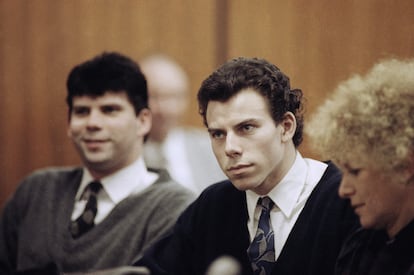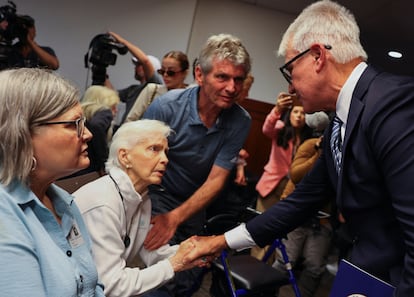Looking to understand the Menendez brothers’ case? Here are the key points
Lyle and Erik were sentenced to life in prison 30 years ago for committing parricide in their Beverly Hills home, but a statement from a former member of Menudo and a letter written months before the crime could help lead to their freedom

On a warm summer evening on August 20, 1989 in their Beverly Hills home, Lyle and Erik Menendez fatally shot their parents, Jose and Kitty Menendez. The sons were 21 and 18 years old. During their two high-profile trials, in 1993, they testified that their father had sexually abused them, beginning when they were just six years old. Lyle, the eldest, said that he had told his mother what was happening, but that she replied that he was exaggerating, and that his father Jose loved them. At the end of the second trial in 1996, they were sentenced to life in prison. On Thursday, October 24, three decades after that ruling, Los Angeles County Attorney General George Gascón announced that he was recommending that the brothers receive a new sentence based on recently discovered evidence. This means that the Menendez brothers could be going free, and soon.
Who were Jose and Kitty Menendez?
Lyle and Erik’s father Jose Menendez was an important music industry executive who immigrated to the United States from Cuba when he was 16 years old. He was the son of a sporting family: his mother was a swimming champion and his father, a soccer star, according to journalist Robert Rand in his new book on the case, The Menendez Murders: The Shocking Untold Story of the Menendez Family and the Killings that Stunned a Nation.
Menendez rose to an executive position at Hertz, a car rental company, and became the owner of record label RCA, his entry into the world of entertainment. He signed big-name groups like Menudo and Eurythmics, and became an important figure in the music industry. On August 20, 1989, his sons used two shotguns to murder him and his wife Kitty (born Mary Louise Andersen), a beauty queen turned housewife whom Jose met in the early 1970s at Southern Illinois University. Afterwards, Lyle called 911: “Someone killed my parents,” he screamed.
After that day, the brothers inherited $14 million, equivalent today to $35 million. They spent a large part of it on watches and luxury cars, and even tried to open a restaurant in New Jersey. During their trial for parricide, these excesses were not seen kindly by the public.
The first televised trial in the United States
In 1990, the Menendez brothers confessed to the crime to their therapist and Lyle was arrested. Erik turned himself in to the police a few days afterwards. Both were accused of first-degree murder.
There were two trials in the case. The opener, which began in July 1993, was the first to be televised in the United States. Defense lawyers argued that the Menendez had committed the crime out of self-defense after years of their father’s sexual and emotional abuse. There were two juries convened, one for each brother, as well as two separate defense teams. A mistrial was declared when it proved impossible to reach a unanimous verdict.
In October 1995, a new trial began, this time with a single jury. According to the defense lawyers, much of the evidence regarding the alleged sexual abuse was kept from jurors and in the spring of 1996, the brothers were pronounced guilty of first-degree murder and sentenced to serve out the rest of their days in a prison cell.

New evidence could lead to a new sentence
In 2023, former Miami Herald journalist Nery Ynclan and Rand’s documentary Menendez + Menudo: Boys Betrayed was released. In it, Roy Roselló, one of the former members of the Puerto Rican boy band, claimed in a sworn affidavit that Jose had sexually abused him when Roselló was just 14 years old.
The Menendez brothers’ lawyers have requested that Roselló's testimony be examined, in addition to other new pieces of evidence that include letters written by the brothers. The first of these was sent to their cousin Andy Cano nine months before the killings by one of the brothers, and it tells of their sexual abuse. The other, sent from Lyle to Erik, also refers to the abuse. This last letter dates from 1990, when both were already in prison.
In light of these new findings, Gascón requested that a judge review the brothers’ sentence. If that request is approved, and since Lyle and Erik were under 26 years old when they committed the murders, it could leave them eligible for parole.
The importance of Netflix — and Kim Kardashian
As Gascón himself has confirmed, recent narrative projects centering on the Menendez brothers that have brought an awareness of their case to a new generation, have been key. The attorney general has said that such accounts helped to accelerate his decisions regarding the case. He explicitly cited two releases, the first being Ryan Murphy’s Monsters: The Lyle and Erik Menendez Story, which starred Javier Bardem as Jose, Chloë Sevigny as Kitty, Nicholas Alexander Chavez as Lyle and Cooper Koch as Erik, and which enjoyed enormous success on the streaming platform. The second is an earlier documentary that also recently premiered on Netflix named The Menendez Brothers. Other platforms like Prime Video and Apple TV+ have also produced their own documentaries on the pair

This media coverage was only enhanced when the queen of hype turned her attention to the case. Reality star Kim Kardashian, who is studying law, has spoken out in support of the brothers. The multimillionaire celebrity visited them at their San Diego prison and published an essay advocating for their release on NBC News. “They are not monsters,” she writes, stating that they “were condemned before the trial even began.” And what a trial it was, she writes. “Erik and Lyle’s case became entertainment for the nation, their suffering and stories of abuse ridiculed in skits on Saturday Night Live.”
“The killings are not excusable,” writes Kardashian. “I want to make that clear. Nor is their behavior before, during or after the crime. But we should not deny who they are today in their 50s. The trial and punishment these brothers received were more befitting a serial killer than two individuals who endured years of sexual abuse by the very people they loved and trusted. I don’t believe that spending their entire natural lives incarcerated was the right punishment for this complex case.”
Sign up for our weekly newsletter to get more English-language news coverage from EL PAÍS USA Edition
Tu suscripción se está usando en otro dispositivo
¿Quieres añadir otro usuario a tu suscripción?
Si continúas leyendo en este dispositivo, no se podrá leer en el otro.
FlechaTu suscripción se está usando en otro dispositivo y solo puedes acceder a EL PAÍS desde un dispositivo a la vez.
Si quieres compartir tu cuenta, cambia tu suscripción a la modalidad Premium, así podrás añadir otro usuario. Cada uno accederá con su propia cuenta de email, lo que os permitirá personalizar vuestra experiencia en EL PAÍS.
¿Tienes una suscripción de empresa? Accede aquí para contratar más cuentas.
En el caso de no saber quién está usando tu cuenta, te recomendamos cambiar tu contraseña aquí.
Si decides continuar compartiendo tu cuenta, este mensaje se mostrará en tu dispositivo y en el de la otra persona que está usando tu cuenta de forma indefinida, afectando a tu experiencia de lectura. Puedes consultar aquí los términos y condiciones de la suscripción digital.









































